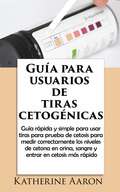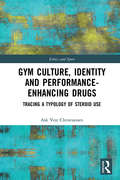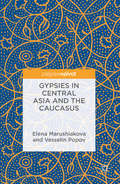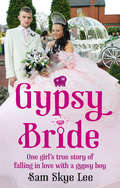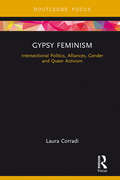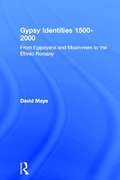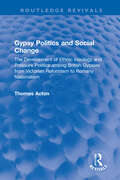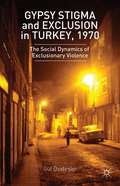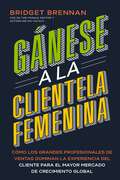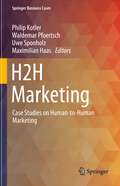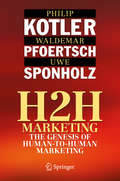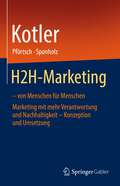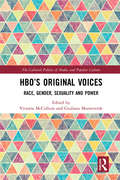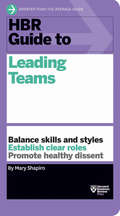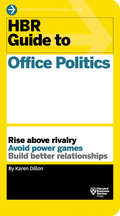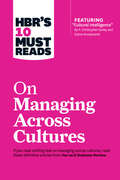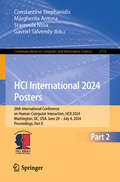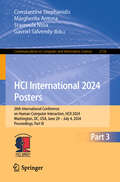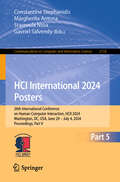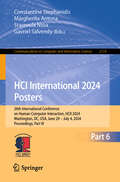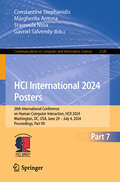- Table View
- List View
Gute Pflege im transkulturellen Vergleich: Eine Studie in der stationären Altenpflege unter Betrachtung immaterieller Werte (Forum Gesundheitsmanagement)
by Bouchra AchoumrarVor dem Hintergrund eines vielfältigen soziokulturellen Umfeldes des Gesundheits- und Pflegewesens gewinnt die Versorgungsqualität im transkulturellen Kontext kontinuierlich an Bedeutung für die professionelle Pflegepraxis und pflegewissenschaftliche Forschung. Nicht zuletzt aufgrund der sozialpolitischen und ökonomischen Vorgaben wird in den Handlungsfeldern der pflegerischen Praxis die Sicherstellung hoher Versorgungsqualität unter Berücksichtigung der Bedürfnisse sämtlicher potenzieller Anspruchsgruppen angestrebt. Zugleich kommt in Anbetracht der knappen Ressourcen in der Altenpflege sämtlichen materiellen und immateriellen Faktoren eine wichtige Relevanz für eine optimale Erreichung qualitativer sowie wirtschaftlicher Ziele zu. Das vorliegende Buch trägt zu einem vertieften Verständnis dessen bei, welche qualitativen Merkmale, Anforderungen und Handlungsweisen einer guten Pflege im transkulturellen Kontext im Setting stationärer Altenpflege seitens Pflegebedürftiger und beruflicher Akteurinnen und Akteure zugeschrieben werden. Neben der Beantwortung pflegewissenschaftlicher Fragestellungen wird unter Bezugnahme auf betriebswirtschaftliche Zusammenhänge ein Beitrag zur empirischen Fundierung und konzeptionellen Weiterentwicklung sogenannter „immaterieller Werte“ in der stationären Altenpflege geleistet.
Guía para usuarios de tiras cetogénicas: Guía rápida para usar tiras cetogénicas, medir niveles de cetona y entrar en cetosis más rápido
by Katherine Aaron¡La guía completa sobre cómo medir los niveles de cetonas en la orina, la sangre y cómo entrar en cetosis más rápido! ¿No está muy seguro si se encuentra en cetosis? ¿Pero tiene fatiga, sed, gripe y mal aliento? ¡Ha seguido una dieta cetogénica durante algunos días! ¿Está buscando una guía completa sobre cómo usar las tiras de prueba de cetosis y las formas de entrar en cetosis más rápido en 48 horas? Si esto es lo que estás experimentando, ¡siga leyendo! Las tiras cetogénicas o las tiras de prueba de cetona son papeles distintivos finamente cortados en los que orina o deja caer sangre y cambiará de color en caso de orina y proporcionará datos en caso de sangre para mostrar los niveles de cetona en el sistema. Estas tiras no solo verifican las cetonas en el cuerpo, sino que también nos ayudarán a informarnos cuando estamos obteniendo demasiadas cetonas que pueden conducir a cetoacidosis (una afección en la que la sangre se vuelve ácida). Estas tiras fueron creadas inicialmente para controlar afecciones médicas como diabetes tipo II, cáncer y epilepsia. Todas estas condiciones pueden ser controladas si las cetonas en el cuerpo están bien mantenidas. Esta guía “GUÍA DEL USUARIO DE TIRAS DE CETOSIS: Guía rápida y fácil de usar tiras de prueba de ceto para medir correctamente los niveles de cetonas en orina, sangre y entrar en cetosis más rápido” brindará información sobre lo siguiente: Cómo entrar en cetosis Entrar en cetosis ¿Por qué la necesidad de cetosis? Afirmar que se encuentra en cetosis Cómo lidiar con los síntomas incómodos causados por la cetosis Cómo entrar en cetosis más rápido Como medir cetonas Cómo funcionan las tiras cetogénicas Tipos de tiras de cetogénicas ¿Son precisas las tiras cetogénicas? Cómo funcionan las tiras de análisis de cetona en sangre<br
Gym Bodies: Exploring Fitness Cultures (Routledge Research in Sport, Culture and Society)
by Amy Clark Ian Wellard James BrightonDrawing on empirical research, this fascinating new book explores the embodied experiences of ‘gym goers’ and the fitness cultures that are constructed within gyms and fitness spaces. Gym Bodies offers a personal, interactive, ethnographic account of the multiplicity of contemporary gym practices, spaces and cultures, including bodybuilding, CrossFit and Spinning. It argues that gym bodies are historically constructed, social, sensual, emotional and political; that experience intersects with multiple embodied identities; and that fitness cultures are profoundly important in shaping the body in wider contemporary culture. This is important reading for students, tutors and researchers working in sport and exercise studies, sociology of the body, health studies, leisure, cultural studies, gender and education. It is also a valuable resource for policy makers and practitioners within the fields of sport, leisure, health and education.
Gym Culture, Identity and Performance-Enhancing Drugs: Tracing a Typology of Steroid Use (Ethics and Sport)
by Ask Vest ChristiansenThis book is about gym culture, the pursuit of fit, muscular bodies and the use of drugs as a means to get there. Building on the international research literature and in-depth interviews with men who have experience of image and performance enhancing drugs (IPEDs), the book explores the fascination with muscles, motivations for using drugs to enhance them, assessments of risks, and experience of side effects. The book examines what the altered body does to the men&’s identity, self-image and relationships with peers and partners. Taking an evolutionary psychological approach, it also investigates the biological and psychological foundations of the fascination with the muscular body and discusses the notion of precarious manhood. Building on these analyses the book considers the political and regulatory initiatives in place to prevent the use of IPEDs and assesses those strategies&’ potential to reach their aims. This is essential reading for anybody with an interest in the issue of drugs in sport, the ethics of sport, sociology of sport, sociology of the body, masculinity or public health.
Gypsies in Central Asia and the Caucasus
by Elena Marushiakova Vesselin PopovThis book explores diverse communities living in Central Asia and the Caucasus, who are generally gathered under the umbrella term of ‘Gypsies’, their multidimensional identities, self-appellations and labels given to them by surrounding populations, researcher and policy-makers. The book presents various Gypsy and Gypsy-like communities and provides a comprehensive review of their history, demography, ways of life, past and present occupations, and contemporary migration in post-Soviet space. The authors situate these communities in historical settings and also in the wider context of contemporary evolving global and areal developments.The book will be of interest to scholars and students of history, sociology, social anthropology, nationalities studies, global and Central Asia and Caucasus areal studies, and Gypsy/Romani studies, and also for policy-makers and civic organizations.
Gypsy Bride: One girl's true story of falling in love with a gypsy boy
by Sam Skye Lee'I felt like Cinderella, Sleeping Beauty, Snow White and all the other fairy-tale princesses, and Pat was my Prince Charming.'Sam Skye Lee had often thought about getting married, but never imagined that her dress would be bright pink with flashing lights and weigh a staggering 20-stone. But then she didn't count on having a gypsy wedding...It's rare for a 'gorger', or non-traveller, to marry into the gypsy community. But after a shocking childhood tragedy, Sam found the comfort she needed from an unxpected source - Patrick and his family of travellers.Gypsy Bride is the heartwarming true story of how an ordinary girl finds herself discovering an extraordinary world. A place where 'grabbing' is a sign a boy fancies you, six-year-olds get spray tans, and christenings, weddings and funerals are jaw-droppingly flamboyant.This love story is more than boy meets girl. It's about a girl who falls in love with a whole race of people and their wonderful ways.
Gypsy Feminism: Intersectional Politics, Alliances, Gender and Queer Activism (Routledge Advances in Sociology)
by Laura CorradiClumsy stereotypes of the Romani and Travellers communities abound, not only culturally in programmes such as Big Fat Gypsy Weddings, but also amongst educators, social workers, administrators and the medical profession. Gypsy cultures are invariably presented as ruled by tradition and machismo. Women are presented as helpless victims, especially when it comes to gendered forms of violence. The reality, however, is much more complicated. In Gypsy Feminism, Laura Corradi demonstrates how Romaphobia – racist and anti-Gypsy rhetoric and prejudice, pervading every level of society – has led to a situation where Romani communities face multiple discrimination. In this context, the empowerment of women and girls becomes still more difficult: until recently, for example, women have largely remained silent about domestic violence in order to protect their communities, which are already under attack. Examining feminist research and action within Romani communities, Corradi demonstrates the importance of an intersectional approach in order to make visible the combination of racism and sexism that Gypsy women face every day. This concise and authoritative book will appeal to scholars and students in the areas of Sociology, Cultural Studies, Women’s and Gender Studies and Anthropology, as well as Politics, Media Studies, Social Policy, and Social Work. It is also an invaluable resource for activists, community and social service workers, and policymakers.
Gypsy Identities 1500-2000: From Egipcyans and Moon-men to the Ethnic Romany
by David MayallGypsies have lived in England since the early sixteenth century, yet considerable confusion and disagreement remain over the precise identity of the group. The question 'Who are the Gypsies?' is still asked and the debates about the positioning and permanence of the boundary between Gypsy and non-Gypsy are contested as fiercely today as at any time before.This study locates these debates in their historical perspective, tracing the origins and reproduction of the various ways of defining and representing the Gypsy from the early sixteenth century to the present day. Starting with a consideration of the early modern description of Gypsies as Egyptians, land pirates and vagabonds, the volume goes on to examine the racial classification of the nineteenth century and the emergence of the ethnic Gypsy in the twentieth century. The book closes with an exploration of the long-lasting image of the group as vagrant and parasitic nuisances which spans the whole period from 1500 to 2000.
Gypsy Politics and Social Change: The Development of Ethnic Ideology and Pressure Politics among British Gypsies from Victorian Reformism to Romany Nationalism (Routledge Revivals)
by Thomas ActonThis book, first published in 1974, analyses the position of the Gypsies in Britain in the twentieth century, and assesses its significance in their overall history. Two dramatic shifts in Government policy towards the Gypsies are examined – in the 1880s and the 1960s – as are the changes in the stereotype of the ‘true Gypsy’. Dr Acton traces the developments of attitudes and economic conditions that gave rise to the 1970s increase in interest in Gypsies, and discusses the concomitant political and pressure group activity. He gives an account of the historical background to modern Gypsy politics; describes the postwar situation of the Gypsies in England and Wales, including pro-Gypsy pressure group activity up to 1965, and goes on to cover the campaigns of the Gypsy Council, including a sociological assessment of its work. He considers these aspects of Gypsy life in the light of modern sociological theory on minorities and race relations.
Gypsy Politics and Social Change: The Development of Ethnic Ideology and Pressure Politics among British Gypsies from Victorian Reformism to Romany Nationalism (Routledge Revivals)
by Thomas ActonThis book, first published in 1974, analyses the position of the Gypsies in Britain in the twentieth century, and assesses its significance in their overall history. Two dramatic shifts in Government policy towards the Gypsies are examined – in the 1880s and the 1960s – as are the changes in the stereotype of the ‘true Gypsy’. Dr Acton traces the developments of attitudes and economic conditions that gave rise to the 1970s increase in interest in Gypsies, and discusses the concomitant political and pressure group activity. He gives an account of the historical background to modern Gypsy politics; describes the postwar situation of the Gypsies in England and Wales, including pro-Gypsy pressure group activity up to 1965, and goes on to cover the campaigns of the Gypsy Council, including a sociological assessment of its work. He considers these aspects of Gypsy life in the light of modern sociological theory on minorities and race relations.
Gypsy Stigma and Exclusion in Turkey, 1970: Social Dynamics of Exclusionary Violence
by Gül ÖzateşlerUsing an oral history approach, this book draws on Gypsy and non-Gypsy narratives to tell the story of Gypsy forced dislocation from Bayramic, a northwestern town of Turkey, in 1970. Gül Özatesler examines memory construction, the categories of Gypsyness and Turkishness, and the different perspectives and positions that emerged, considering all in relation to underlying socioeconomic structure. The book reveals how ethnic and other identities can be deployed to conceal socioeconomic and political inequalities.
Gánese a la clientela femenina: Cómo transformar la experiencia del cliente para los consumidores más poderosos del mundo
by Bridget BrennanLa primera pregunta que le hacen los vendedores a Bridget Brennan, CEO de Female Factor, es siempre la misma: «¿Cómo puedo sobrevivir cuando los clientes tienen tantas opciones respecto de dónde comprar mi producto?». Si bien hay muchas estrategias para crecer en ventas, la que ella visualiza es la que muchos vendedores pasar por alto, o sea, la más obvia: hacer que la experiencia del cliente sea tan grande que quieran invertir su tiempo y dinero con usted. Dado que las mujeres manejan entre el 70% y el 80% del presupuesto de consumo familiar y le otorgan un valor tan alto a la experiencia del servicio, esto parece no tener demasiada ciencia. ¿Sentido común? Sí. ¿Práctica común? No. En esta era tecnológica que se acelera vertiginosamente, hay una necesidad urgente de un nuevo modelo de ventas dirigido a la consumidora que empuña hábilmente su smartphone, instruida en Google, amante de las marcas, y que a menudo conoce más sobre los productos que desea adquirir que el mismo vendedor que se para frente a ella. En este nuevo libro, Brennan brinda a los profesionales de ventas una guía para dominar las habilidades necesarias para la comercialización en el siglo XXI.
H2H Marketing: Case Studies on Human-to-Human Marketing (Springer Business Cases)
by Philip Kotler Waldemar Pfoertsch Uwe Sponholz Maximilian HaasH2H Marketing focuses on redefining the role of marketing by reorienting the mindset of decision-makers and integrating the concepts of Design Thinking, Service-Dominant Logic and Digitalization. Following the authors' successful book on H2H Marketing, this book brings foward selected case studies showcasing various aspects of the concept, its fundamental elements, and its implementation.
H2H Marketing: The Genesis of Human-to-Human Marketing
by Philip Kotler Waldemar Pfoertsch Uwe SponholzIn H2H Marketing the authors focus on redefining the role of marketing by reorienting the mindset of decision-makers and integrating the concepts of Design Thinking, Service-Dominant Logic and Digitalization. It’s not just technological advances that have made it necessary to revisit the way everybody thinks about marketing; customers and marketers as human decision-makers are changing, too. Therefore, having the right mindset, the right management approach and highly dynamic implementation processes is key to creating innovative and meaningful value propositions for all stakeholders. This book is essential reading for the following groups: Executives who want to bring new meaning to their lives and organizations Managers who need inspirations and evidence for their daily work in order to handle the change management needed in response to the driving forces of technology, society and ecology Professors, trainers and coaches who want to apply the latest marketing principles Students and trainees who want to prepare for the future Customers of any kind who need to distinguish between leading companies Employees of suppliers and partners who want to help their firms stand out. The authors review the status quo of marketing and outline its evolution to the new H2H Marketing. In turn, they demonstrate the new marketing paradigm with the H2H Marketing Model, which incorporates Design Thinking, Service-Dominant Logic and the latest innovations in Digitalization. With the new H2H Mindset, Trust and Brand Management and the evolution of the operative Marketing Mix to the updated, dynamic and iterative H2H Process, they offer a way for marketing to find meaning in a troubled world.
H2H-Marketing – von Menschen für Menschen: Marketing mit mehr Verantwortung und Nachhaltigkeit – Konzeption und Umsetzung
by Philip Kotler Waldemar Pförtsch Uwe SponholzDieses Buch zeigt, warum sich Marketing zu einem nachhaltigeren und verantwortungsvollen Handeln weiterentwickeln muss und wie das professionell gelingen kann. Unternehmen müssen heute die Beziehung zu den Menschen in den Mittelpunkt ihres unternehmerischen Wirkens setzen. Neue Angebote, Kommunikations- und Vertriebskonzepte sind dafür notwendig, um die gestiegenen Erwartungen der Menschen von heute erfüllen zu können. Für Unternehmen ist damit die große Chance verbunden, sich als proaktive Change Agents zu positionieren und eine authentische, sinnstiftende sowie verantwortungsvolle Rolle bei der Lösung der Probleme ihrer Kunden einzunehmen. Das H2H-Modell integriert dafür in einzigartiger Form aktuelle Managementkonzepte sowie Design Thinking und Service-Dominant Logic, gepaart mit den Chancen der Digitalisierung. Zugleich vereinfacht es kompliziert gewordene Marketingprozesse und implementiert fortschrittliche Management- und Entscheidungskonzepte. Die junge Generation kritisiert zu Recht, dass zu viel über Klimawandel, Nachhaltigkeit und wachsende Armut geredet, aber zu wenig gehandelt wird. Stattdessen wird der Hyperkonsum weiter angeheizt. Die Jugend legt den Finger in die Wunde. Es ist Zeit, jetzt umzudenken. Unternehmen, die dieser Botschaft keine Taten folgen lassen, werden Kunden verlieren. Wer diesen Weg in die Zukunft beschreiten will, muss bereit sein, neue Gedanken zuzulassen und den Menschen mit seinen Bedürfnissen und Erwartungen konsequent in den Mittelpunkt zu stellen. Den Leitfaden dazu bietet dieses Buch – mit gut durchdachten Konzepten und inspirierenden Beispielen.
HB: Aspects of Harvergal Brian (Routledge Revivals)
by Jürgen SchaarwächterFirst published in 1997, This volume brings together a wide selection of those articles which include interviews, personal recollections of Brian and several detailed analyses of some of his works, generously illustrated with music examples. The book concludes with a recently updated catalogue of works.
HBO’s Original Voices: Race, Gender, Sexuality and Power (The Cultural Politics of Media and Popular Culture)
by Victoria McCollum Giuliana MonteverdeThis book constitutes the first major exploration of HBO's current programming, examined in the context of the transformation of American television and global society. With studies of well-known shows such as Game of Thrones, Girls, Insecure, Looking, Silicon Valley, The Comeback, The Leftovers, True Detective and Veep and Vinyl, the authors examine the trends in current programming, including the rise of queer characters, era-defining comedy, reinvented fantasy series, and the content’s new awareness of gender, sexuality and family dysfunction. Interdisciplinary and international in scope, HBO’s New and Original Voices explores the sociocultural and political role and impact that HBO's current programmes have held and the ways in which it has translated and reinterpreted social discourses into its own televisual language. A significant intervention in television studies, media studies and cultural studies, this book illuminates the emergence of a new era of culturally relevant television that fans, students, and researchers will find lively, accessible and fascinating.
HBR Guide to Leading Teams (HBR Guide Series)
by Mary ShapiroGreat teams don't just happen.How often have you sat in team meetings complaining to yourself, "Why does it take forever for this group to make a simple decision? What are we even trying to achieve?" As a team leader, you have the power to improve things. It's up to you to get people to work well together and produce results.Written by team expert Mary Shapiro, the HBR Guide to Leading Teams will help you avoid the pitfalls you've experienced in the past by focusing on the often-neglected people side of teams. With practical exercises, guidelines for structured team conversations, and step-by-step advice, this guide will help you: Pick the right team members Set clear, smart goals Foster camaraderie and cooperation Hold people accountable Address and correct bad behavior Keep your team focused and motivated
HBR Guide to Office Politics
by Karen DillonEvery organization has its share of political drama: Personalities clash. Agendas compete. Turf wars erupt. But you need to work productively with your colleagues—even the challenging ones—for the good of your organization and your career. How can you do that without compromising your integrity? By acknowledging that power dynamics and unwritten rules exist—and constructively navigating them. Whether you’re a new professional or an experienced one, this guide will teach you how to: (1) Build relationships with difficult people, (2) gain allies and increase your sphere of influence, (3) wrangle resources, (4) move up without alienating your colleagues, (5) avoid power games and petty rivalries, and (6) claim credit when it’s due.
HBR's 10 Must Reads on Managing Across Cultures (with featured article Cultural Intelligence by P. Christopher Earley and Elaine Mosakowski)
by Harvard Business Review Yves L. Doz Hal Gregersen Erin Meyer Jeanne BrettPut an end to miscommunication and inefficiency-and tap into the strengths of your diverse team.If you read nothing else on managing across cultures, read these 10 articles. We've combed through hundreds of Harvard Business Review articles and selected the most important ones to help you manage culturally diverse employees, whether they're dispersed around the world or you're working with a multicultural team in a single location.This book will inspire you to: Develop your cultural intelligence Overcome conflict on a team where cultural norms differ Adopt a common language for more efficient communication Use the diverse perspectives of your employees to find new business opportunities Take varying cultural practices into account when resolving ethical issues Accommodate and plan for your expatriate employeesThis collection of articles includes "Cultural Intelligence," by P. Christopher Earley and Elaine Mosakowski; "Managing Multicultural Teams," by Jeanne Brett, Kristin Behfar, and Mary C. Kern; "L'Oreal Masters Multiculturalism," by Hae-Jung Hong and Yves Doz; "Making Differences Matter: A New Paradigm for Managing Diversity," by David A. Thomas and Robin J. Ely; "Navigating the Cultural Minefield," by Erin Meyer; "Values in Tension: Ethics Away from Home," by Thomas Donaldson; "Global Business Speaks English," by Tsedal Neeley; "10 Rules for Managing Global Innovation," by Keeley Wilson and Yves L. Doz; "Lost in Translation," by Fons Trompenaars and Peter Woolliams; and "The Right Way to Manage Expats," by J. Stewart Black and Hal B. Gregersen.
HCI International 2024 Posters: 26th International Conference on Human-Computer Interaction, HCII 2024, Washington, DC, USA, June 29 – July 4, 2024, Proceedings, Part II (Communications in Computer and Information Science #2115)
by Gavriel Salvendy Margherita Antona Constantine Stephanidis Stavroula NtoaThe seven-volume set CCIS 2114-2120 contains the extended abstracts of the posters presented during the 26th International Conference on Human-Computer Interaction, HCII 2024, held in Washington, DC, USA, during June 29–July 4, 2024. The total of 1271 papers and 309 posters included in the HCII 2024 proceedings were carefully reviewed and selected from 5108 submissions. The posters presented in these seven volumes are organized in the following topical sections: Part I: HCI Design Theories, Methods, Tools and Case Studies; User Experience Evaluation Methods and Case Studies; Emotions in HCI; Human Robot Interaction. Part II: Inclusive Designs and Applications; Aging and Technology. Part III: eXtended Reality and the Metaverse; Interacting with Cultural Heritage, Art and Creativity. Part IV: HCI in Learning and Education; HCI in Games. Part V: HCI in Business and Marketing; HCI in Mobility and Automated Driving; HCI in Psychotherapy and Mental Health. Part VI: Interacting with the Web, Social Media and Digital Services; Interaction in the Museum; HCI in Healthcare. Part VII: AI Algorithms and Tools in HCI; Interacting with Large Language Models and Generative AI; Interacting in Intelligent Environments; HCI in Complex Industrial Environments.
HCI International 2024 Posters: 26th International Conference on Human-Computer Interaction, HCII 2024, Washington, DC, USA, June 29 – July 4, 2024, Proceedings, Part III (Communications in Computer and Information Science #2116)
by Gavriel Salvendy Margherita Antona Constantine Stephanidis Stavroula NtoaThe seven-volume set CCIS 2114-2120 contains the extended abstracts of the posters presented during the 26th International Conference on Human-Computer Interaction, HCII 2024, held in Washington, DC, USA, during June 29–July 4, 2024. The total of 1271 papers and 309 posters included in the HCII 2024 proceedings were carefully reviewed and selected from 5108 submissions. The posters presented in these seven volumes are organized in the following topical sections: Part I: HCI Design Theories, Methods, Tools and Case Studies; User Experience Evaluation Methods and Case Studies; Emotions in HCI; Human Robot Interaction. Part II: Inclusive Designs and Applications; Aging and Technology. Part III: eXtended Reality and the Metaverse; Interacting with Cultural Heritage, Art and Creativity. Part IV: HCI in Learning and Education; HCI in Games. Part V: HCI in Business and Marketing; HCI in Mobility and Automated Driving; HCI in Psychotherapy and Mental Health. Part VI: Interacting with the Web, Social Media and Digital Services; Interaction in the Museum; HCI in Healthcare. Part VII: AI Algorithms and Tools in HCI; Interacting with Large Language Models and Generative AI; Interacting in Intelligent Environments; HCI in Complex Industrial Environments.
HCI International 2024 Posters: 26th International Conference on Human-Computer Interaction, HCII 2024, Washington, DC, USA, June 29 – July 4, 2024, Proceedings, Part V (Communications in Computer and Information Science #2118)
by Gavriel Salvendy Margherita Antona Constantine Stephanidis Stavroula NtoaThe seven-volume set CCIS 2114-2120 contains the extended abstracts of the posters presented during the 26th International Conference on Human-Computer Interaction, HCII 2024, held in Washington, DC, USA, during June 29–July 4, 2024. The total of 1271 papers and 309 posters included in the HCII 2024 proceedings were carefully reviewed and selected from 5108 submissions. The posters presented in these seven volumes are organized in the following topical sections: Part I: HCI Design Theories, Methods, Tools and Case Studies; User Experience Evaluation Methods and Case Studies; Emotions in HCI; Human Robot Interaction. Part II: Inclusive Designs and Applications; Aging and Technology. Part III: eXtended Reality and the Metaverse; Interacting with Cultural Heritage, Art and Creativity. Part IV: HCI in Learning and Education; HCI in Games. Part V: HCI in Business and Marketing; HCI in Mobility and Automated Driving; HCI in Psychotherapy and Mental Health. Part VI: Interacting with the Web, Social Media and Digital Services; Interaction in the Museum; HCI in Healthcare. Part VII: AI Algorithms and Tools in HCI; Interacting with Large Language Models and Generative AI; Interacting in Intelligent Environments; HCI in Complex Industrial Environments.
HCI International 2024 Posters: 26th International Conference on Human-Computer Interaction, HCII 2024, Washington, DC, USA, June 29 – July 4, 2024, Proceedings, Part VI (Communications in Computer and Information Science #2119)
by Gavriel Salvendy Margherita Antona Constantine Stephanidis Stavroula NtoaThe seven-volume set CCIS 2114-2120 contains the extended abstracts of the posters presented during the 26th International Conference on Human-Computer Interaction, HCII 2024, held in Washington, DC, USA, during June 29–July 4, 2024. The total of 1271 papers and 309 posters included in the HCII 2024 proceedings were carefully reviewed and selected from 5108 submissions. The posters presented in these seven volumes are organized in the following topical sections: Part I: HCI Design Theories, Methods, Tools and Case Studies; User Experience Evaluation Methods and Case Studies; Emotions in HCI; Human Robot Interaction. Part II: Inclusive Designs and Applications; Aging and Technology. Part III: eXtended Reality and the Metaverse; Interacting with Cultural Heritage, Art and Creativity. Part IV: HCI in Learning and Education; HCI in Games. Part V: HCI in Business and Marketing; HCI in Mobility and Automated Driving; HCI in Psychotherapy and Mental Health. Part VI: Interacting with the Web, Social Media and Digital Services; Interaction in the Museum; HCI in Healthcare. Part VII: AI Algorithms and Tools in HCI; Interacting with Large Language Models and Generative AI; Interacting in Intelligent Environments; HCI in Complex Industrial Environments.
HCI International 2024 Posters: 26th International Conference on Human-Computer Interaction, HCII 2024, Washington, DC, USA, June 29 – July 4, 2024, Proceedings, Part VII (Communications in Computer and Information Science #2120)
by Gavriel Salvendy Margherita Antona Constantine Stephanidis Stavroula NtoaThe seven-volume set CCIS 2114-2120 contains the extended abstracts of the posters presented during the 26th International Conference on Human-Computer Interaction, HCII 2024, held in Washington, DC, USA, during June 29–July 4, 2024. The total of 1271 papers and 309 posters included in the HCII 2024 proceedings were carefully reviewed and selected from 5108 submissions. The posters presented in these seven volumes are organized in the following topical sections: Part I: HCI Design Theories, Methods, Tools and Case Studies; User Experience Evaluation Methods and Case Studies; Emotions in HCI; Human Robot Interaction. Part II: Inclusive Designs and Applications; Aging and Technology. Part III: eXtended Reality and the Metaverse; Interacting with Cultural Heritage, Art and Creativity. Part IV: HCI in Learning and Education; HCI in Games. Part V: HCI in Business and Marketing; HCI in Mobility and Automated Driving; HCI in Psychotherapy and Mental Health. Part VI: Interacting with the Web, Social Media and Digital Services; Interaction in the Museum; HCI in Healthcare. Part VII: AI Algorithms and Tools in HCI; Interacting with Large Language Models and Generative AI; Interacting in Intelligent Environments; HCI in Complex Industrial Environments.

